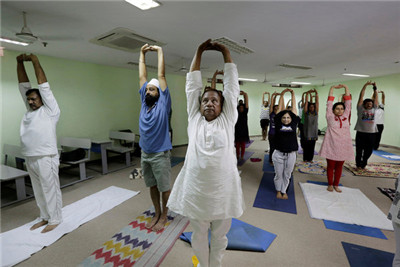(单词翻译:单击)
NEW DELHI — On a sticky morning last week, Deputy Commissioner Chandra Shekhar Sahukar of India’s Agriculture Ministry (animal husbandry department, small ruminant section) found himself in a yoga class for the first time in his 57 years, miserably grasping his ankle.
新德里——上周,在一个闷热的早上,印度农业部(畜牧处小型反刍动物科)的副主管钱德拉·谢卡尔·萨胡卡(Chandra Shekhar Sahukar)在瑜伽课上艰难地抓着自己的脚踝,这是他生平57年来第一次上瑜伽课。
In his bag he carried a photocopy of a memorandum advising senior officials to familiarize themselves with certain postures ahead of International Yoga Day this Sunday, when they will take part in a mass outdoor yoga session scheduled to begin at 7 a.m. The session is intended to qualify for the Guinness Book of World Records, the memo says, warning, “If some officials turn up without practice, there will be risk of the record claim being affected.”
他的包里有一份备忘录的复印件,上面建议高级官员在周日的“国际瑜伽日”(International Yoga Day)之前熟悉某些姿势,因为预定从周日早上7点开始,他们将参加一场大型户外瑜伽活动。这个活动旨在创下吉尼斯世界纪录,备忘录警告说,“如果一些到场的官员没有事先做好练习,纪录就有可能受到影响。”

At the front of the room, the instructor was folding and unfolding himself like a pocketknife, and pointedly reminding members of the class that they would soon be performing under the scrutiny of “Modi-saab.” When he asked the students to press their faces to their knees, Mr. Sahukar — whose professional duties, he noted later, include “a lot of sitting” — could keep silent no longer.
在房间的前部,老师一边像折叠刀似的叠合、展开自己的身体,一边毫不含糊地提醒学员,他们很快就要在“莫迪大大”(Modi-saab)的监督下做这些姿势了。当他要学员们把脸埋在膝盖上时,萨胡卡再也无法保持沉默了(他后来提到,他的工作“很多时候都需要坐着”)。
“It’s not touching!” he exclaimed. “I can’t bend anymore!”
“我挨不到!”他喊道。“我没法再弯了!”
Of the major initiatives that Prime Minister Narendra Modi has introduced since taking office, few have generated as much static as Yoga Day, which will feature a 35-minute public demonstration of poses by more than 35,000 government employees, students and other citizens. Though the Western world regards yoga primarily as physical exercise, Indians are more apt to see its postures and Sanskrit chants as freighted with ideological or religious meaning.
印度总理纳伦德拉·莫迪(Narendra Modi)上任以来推出了一些重大举措,其中几乎没有哪一个产生了“瑜伽日”这么大的声势。瑜伽日要求逾3.5万名政府雇员、学生和其他公众进行35分钟的公开表演。尽管西方世界觉得瑜伽主要是锻炼身体的方式,但印度人更倾向于认为,瑜伽姿势和梵语念诵具有意识形态或宗教意义。
Shripad Naik, India’s first minister overseeing yoga and traditional medicine, who has helped organize this month’s celebration, said it was time to clear away the vestiges of a Western lifestyle left behind by colonial powers.
什里帕德·奈克(Shripad Naik)是印度主管瑜伽和传统医学的第一部长,他帮助组织了这个月的庆祝活动,并表示现在是时候清除殖民列强遗留的西方生活方式的印记了。
“Earlier, our people used to get up before sunrise and sleep before sunset, but now our lifestyle has changed. They are going to the pub, they will go in the middle of the night, at 12 or 1, and eat chicken and many, many new dishes,” said Mr. Naik, who, like the prime minister, rises before dawn and practices yoga daily. He recommends going to sleep by 9 p.m., gets his news from the Hindi-language press and proudly declares that he has never had an injection.
“过去,印度人在日出前起床,日落前休息,但现在我们的生活方式发生了变化。人们会去酒吧,而且在深夜12点或1点去,还吃鸡肉以及很多、很多新菜式,”像莫迪一样,奈克每天在黎明之前起床练瑜伽。他建议大家在9点前睡觉。他通过印地语媒体了解新闻,而且自豪地宣称自己从未打过针。
“There will be a lifestyle change,” he said. “Our style will come.”
“这里会出现生活方式上的改变,”他说。“我们的生活方式将会到来。”
Mr. Modi is not the first Indian leader to promote yoga. Indira Gandhi was so devoted to her yoga instructor, Dhirendra Brahmachari, that he accompanied her family when it traveled, and became known as the “flying guru.”
莫迪不是第一个推广瑜伽运动的印度领导人。英迪拉·甘地(Indira Gandhi)对她的瑜伽教练迪伦德拉·婆罗马恰里(Dhirendra Brahmachari)非常信任,以至于当她的家人旅游时,他也会陪伴同行,因此还有了一个“飞行大师”的称号。
At events, Mr. Modi often shares the dais with Baba Ramdev, who presides over an ayurvedic medical empire and has preached against influences he describes as foreign, among them the English language, chemical pesticides and fertilizers. Mr. Naik, the yoga minister, himself learned yoga through the R.S.S., and said he hoped that the widespread practice of yoga would lower rates of violent crime.
在各种活动中,莫迪经常与巴巴·兰德弗(Baba Ramdev)同场演讲。此人经营着一个阿育吠陀医学帝国,鼓吹反对英语、化学农药和化肥等事物,并称它们是“外国”的影响。主管瑜伽的部长奈克是通过RSS学会瑜伽的,他希望瑜伽的普及可以降低暴力犯罪率。
“You see these rapes happening, all these bad habits. When he is doing something positive, the bad will be out of him,” he said.
“你看到会有强奸案发生,人们有那么多坏习惯。当人们做积极的事情时,就会摆脱那些坏事情,”他说。
As for government workers, Mr. Naik said, they will become more productive and less corrupt. “There will be a definite change in the way the bureaucracy functions,” he said. “When they are thin, all their energy will go into producing better work. There is no need to do it forcefully, once we have put them on the right path.”
至于政府工作人员,奈克表示,他们会提高效率、减少腐败。“职能机构的工作作风会产生明显的变化,”他说。“当他们瘦下来,他们的全部精力就会用在更好地开展工作上。一旦我们让他们走上正确的道路,就不需要采取强制手段了。”
Bal Mukund Singh, the yoga instructor, ended the class by urging his students to become Hanuman, the monkey god, and then watched as they dispersed to the offices where they would spend their days handling dusty file folders and eating fritters. When they were out of sight, he checked off the characteristics he had observed, things like “big tummy, rigid body, less flexibility, stress, tension, depression, diabetes.” Still, he said cheerfully, these are good days.
瑜伽教练巴尔·木孔德·辛格(Bal Mukund Singh)在这堂课结束时,敦促学员们向猴神哈努曼(Hanuman)看齐,然后目送学员们回到各自的办公室。这些人日常处理尘封的档案夹,爱吃油炸面团。当他们离开视线之后,他列举了观察到的学员特征,比如“肚子大、身体僵硬、灵活性较差、压力大、紧张、抑郁、有糖尿病。”不过他高兴地说,现在的形势很好。
“They heard it on TV, and they are running toward the yoga,” he said. “The prime minister is the king. If the king does something, that is very effective. And this time, our king is doing yoga.”
“他们在电视上看到了新闻,就跑来做瑜伽,”他说。“总理就像国王。如果国王在做什么事情,就会产生非常好的带动效果。目前,我们的国王正在做瑜伽。”


